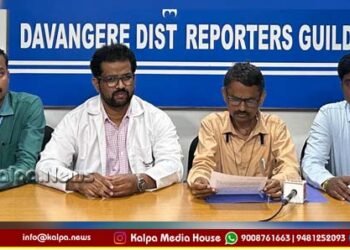Kalpa Media House | Bengaluru |
The Energy department is fully geared to meet the State’s energy requirements of 19,000 MW power demand during the upcoming summer months, and there will be no load shedding, Energy Minister K J George said today.
“Over the past two months, Karnataka has experienced a significant increase in power consumption, leading to an unprecedented demand of 19,000 MW. However, there will be no load shedding, as the State is fully prepared to meet the rising demand during the upcoming summer months. The surge in power consumption is also a positive indicator of broader economic recovery in the State,” said K.J. George after a review meeting with senior officials of the Energy Department.
The State has sufficient electricity to meet the demand. Apart from occasional power supply interruptions due to local technical issues, load shedding will not be needed. The Energy Minister said farmers’ agricultural pump sets will receive 7 hours of electricity, while industrial and household consumers will have a continuous 24-hour supply.

On Wednesday (February 28), 3,300 MW of electricity was generated from KPCL’s thermal power stations, 2,000 MW from hydroelectric units, 126 MW from UPCL, 6,655 MW from solar, and 1,940 MW from wind. Additionally, 6,183 MW of electricity was received from CGS (Central Generating Stations), and 600 MW was purchased from the central grid. Electricity was also obtained from Punjab and Uttar Pradesh on an exchange basis, totalling 700 MW.

While the State is producing more electricity than the current demand, there is no storage facility. To address this, it has been decided to implement storage projects, including a 2000 MW capacity at Sharavathi Pumped Storage, 1600 MW at Varahi Pumped Storage, 1000 MW at Pavagada, and a 2000 MW battery storage project at Ryapte. These initiatives will ensure the State does not face any electricity shortages,” the Energy Minister said.

In certain substations, electricity demand has spiked, leading to overloading, while in other areas, more electricity is available than needed, causing underload. To address this, priority is being given to the link line system. This system transfers electricity from underloaded substations to those experiencing overload, thereby balancing the power distribution. The establishment of link lines has already been completed in some areas.
Although the State has sufficient electricity, the challenge lies in its transmission and distribution. To resolve this, the number of substations is being increased, with a plan to establish 100 new substations in the current financial year. Efforts are being made to address most transmission and distribution issues within the next two years.

To ensure 24-hour electricity for domestic use, the state government has launched the ‘Niranthara Jyothi’ scheme. Under this scheme, single-phase electricity is provided at night to benefit those in farm houses. However, farmers have been using converters to operate agricultural pump sets during the single-phase supply, which has resulted in power trips and widespread outages, causing inconvenience to the public. Therefore, Energy Minister K.J. George urged that under no circumstances should IP sets be used with converters for single-phase electricity supply.
Additional Chief Secretary Energy Department Gaurav Gupta, KPTCL Managing Director Pankaj Kumar Pandey, PCKL Managing Director Snehal Lokhande Sudhakar, BESCOM Managing Director Dr N. Shivashankar IAS, KREDL Chairman TD Rajegowda, KREDL Managing Director KP Rudrappiah, Managing Director of other ESCOMS, and other department officials attended the meeting.
Contact for news and advertising: Whatsapp: 9008761663, 9481252093 – info@kalpa.news









Discussion about this post